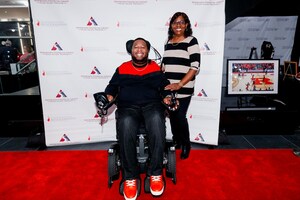SHORT HILLS, N.J., Oct. 17, 2018 /PRNewswire/ -- The Christopher & Dana Reeve Foundation, a nonprofit dedicated to improving quality of life for people living with paralysis, has created a series of booklets that features information about different aspects of health and real-life situations while living with paralysis. These booklets can be found on the Foundation's Publications Page, which also features the Progress in Research newsletter series, annual reports, policy briefs, and many more topics to browse through.
The topics of some of the booklets available include:
Bladder Management: The primary goals of a bladder management plan are to remain free of infections, protect the urinary system from damage, avoid accidents that can impact family, work and social life, and help maintain a high quality of life. Spinal cord injury affects each person differently depending on the level of injury. It's up to each person to learn what works best for them and adapt their planning appropriately.
Catheter care is an important part of living a healthy life. There are three main types of catheterization: intermittent, indwelling, and the external catheter option for men. Poor bladder management can lead to a number of kidney and bladder complications including urinary tract infections, sepsis, and kidney failure. There are numerous ways of avoiding potentially dangerous urinary tract complications. Meticulous genitourinary hygiene is essential. This booklet, sponsored by Hollister Inc., contains information about potential urinary tract complications and recommended methods of preventing those complications.
Bowel Management: The goal of a bowel management program is to ensure a reduced risk of incontinence, constipation, and other GI problems. You need to start a bowel management program immediately after your injury. Your nurse will help while you're in the hospital and rehabilitation. However, once you're home, it's up to you and your caregiver to maintain your bowel program. Key components of an effective plan are consistent scheduling, good hygiene, and using external stimulation. This booklet in our sponsored series from Hollister Inc. includes information on potential GI, pressure, and constipation complications, including colostomy options.
Pressure Injuries & Skin Management: Skin care is no small issue for people living with paralysis. The risk of skin complications increases if blood flow to the skin is restricted, even for a relatively short time in some cases. Pressure injuries can be painful and debilitating if not caught early and treated fully. Severe pressure injuries can take months to heal, sometimes requiring surgery. Age and other health conditions, like diabetes, can increase the risk of sores and complications. Paralysis often entails loss of sensation, so you may not realize a problem is starting because your brain isn't receiving the messages that signal discomfort or pain.
Noticing changes in your skin at the earliest time possible is therefore paramount. The best line of defense against skin complications is a proper management plan. A combination of good skin care, the frequent movement to relieve and disperse pressure, and continual vigilance against signs of a problem are needed to manage skin care well. For more information on warning signs, different healing measures for complications, and proactive safety measures to take, download the pressure injury booklet via the link above.
Managing Spasticity: As a type of movement disorder, spasticity varies from mild muscle stiffness to severe, uncontrollable movements. Symptoms may include increased muscle tone, rapid muscle contractions, stiff joints, exaggerated deep tendon reflexes, and involuntary movements. Spasticity may cause pain, loss of range of motion, and may be linked to pressure injuries, broken bones, and sleep disorders.
Spasticity is the result of miscommunication of messages by the spinal cord. There are a multitude of options for treating spasticity including passive or active movement, oral or injected medications, or a combination of these treatments. For more options on self-care and things to look out for, download the booklet via the link above or check out our spasticity page.
These booklets are also available in Spanish on our international pages.
About the Reeve Foundation:
The Christopher & Dana Reeve Foundation is dedicated to curing spinal cord injury by funding innovative research and improving the quality of life for people living with paralysis through grants, information, and advocacy. We meet all 20 of the Better Business Bureau's standards for charity accountability and hold the BBB's Charity Seal. The Paralysis Resource Center (PRC) is a program of the Reeve Foundation and is funded through a cooperative agreement with the Administration for Community Living (cooperative agreement number 90PRRC0002). For more information, please visit our website at www.ChristopherReeve.org or call 800-539-7309.
Additional Links
http://www.christopherreeve.org
https://www.christopherreeve.org/living-with-paralysis/health/secondary-conditions/autonomic-dysreflexia
www.christopherreeve.org/bowel
www.christopherreeve.org/bladder
SOURCE Christopher & Dana Reeve Foundation
Related Links
http://www.christopherreeve.org
WANT YOUR COMPANY'S NEWS FEATURED ON PRNEWSWIRE.COM?
Newsrooms &
Influencers
Digital Media
Outlets
Journalists
Opted In





Share this article